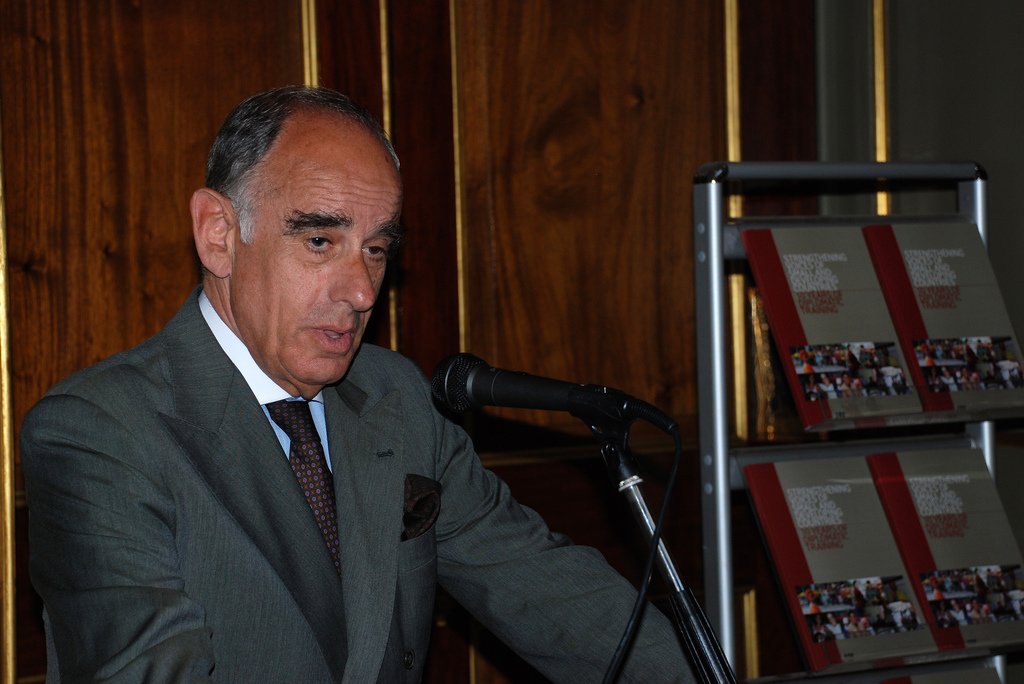Calmy-Rey to push for Bilaterals III with EU

Swiss Foreign Minister Micheline Calmy-Rey will be under the spotlight on Tuesday in Brussels as she argues the case for another round of bilateral negotiations.
Switzerland is confident that a third round of bilateral treaties is possible. But the European Union has said it wants a more comprehensive agreement and automatic acceptance of changes in EU legislation, which the Swiss reject.
During her visit to the Belgium capital for exploratory talks, the foreign minister is due to meet the European Council President Herman van Rompuy and the European Commission President Jose Manuel Barroso.
She will also hold talks with European Parliament President Jerzy Buzek, a sign that Bern has understood the increasingly important role played by members of the European Parliament (MEPs), who now have a much greater say over bilateral accords.
“The European Commission President Jose Manuel Barroso is an open man. There is every chance that Switzerland [and the EU] can agree on a new basis for common negotiations,” Calmy-Rey said during a joint news conference with Hungarian President Pal Schmitt in Budapest on Thursday. Hungary is the current holder of the EU presidency.
But can the EU really consent to another round of bilateral negotiations with the Swiss at a time when Brussels is hammering home the message for a rethink of the “bilateral path”?
Switzerland is not a member of the EU and over the past decade it has concluded two packages of bilateral treaties with the 27-nation bloc covering 16 different policy areas.
Tailor-made
Brussels no longer wants to sign tailor-made agreements with Switzerland and says the time for bilateral treaties and static sectoral accords is over. It wants Switzerland to adopt EU rules automatically and is also promoting the institution of an arbitration court.
The Swiss government, however, has insisted that it wants to continue with bilateral accords and has ruled out the automatic adoption of EU law.
Switzerland believes the EU wants to see developments in a number of fields, such as competition, agricultural free trade and electricity.
On institutional issues like jurisprudence, the monitoring of accords and the choice of an arbitration court, there is a “convergence of views on the objectives but divergence over how to get there”, a Swiss official told swissinfo.ch anonymously.
Calmy-Rey is likely to stress the fact that within Switzerland an “internal front” is hostile to any institutional concessions, especially unilateral ones which are not compensated.
Linking all the issues for negotiation would have two advantages, say the Swiss. It would result in balanced solutions that are acceptable for the Swiss public, in which institutional concessions would be compensated by sectoral progress that benefits the economy. Bilateral III negotiations would be long and would be completed after the Swiss federal elections on October 23.
Movement required
“Barroso knows the Swiss context well. It’s not in his interest to flatly refuse to examine the requests of Micheline Calmy-Rey, who he is close to,” a European Commission official commented anonymously.
“We do not wish to paralyse bilateral relations. We want to look at things properly in a general package that is much wider and digestible for Switzerland. But one thing is clear – Switzerland must move.”
For Brussels the request for an institutional component is not just academic.
“It’s very definite. It’s a very strong need that arises in various sectoral agreements that have already been signed,” he added.
“We are conscious of Switzerland’s institutional difficulties, but we have to find a solution. Today we see that Switzerland has a bilateral approach for resolving differences via a court of arbitration. But this is not the system that we have inside the EU and we can’t move forward on two different tracks.”
Backed by member states, the European Commission will therefore be paying close attention to Calmy-Rey’s words.
“We have a common political interest to deepen our relations with Switzerland. We share the same values. We may accept a package while remaining very vigilant about parallel progress,” explained the Brussels official.
“But our red lines must not be overstepped.”
Switzerland is not a member of the EU but it has concluded 20 major bilateral agreements with the 27-nation bloc.
There are also about 100 secondary bilateral accords between Bern and Brussels.
Bilateral treaty I
(1999) focused on opening up markets, the free movement of persons, technical barriers to trade, public markets, agriculture, air, road and rail transport and Swiss participation in EU research programmes.
Bilateral treaty II
(2004) covered new economic interests and extended to cooperation and political questions (internal security, asylum, environment and culture), the Schengen/Dublin Accords, savings tax, processed agricultural products, media, environment, statistics, fraud, pensions, education and professional training.
Negotiations are underway to update existing accords (the free movement of persons, technical barriers to trade, public markets, air transport, processed agricultural products,) There are plans to adapt the accords on savings tax and fraud.
New talks were launched in 2007 for electricity, agriculture, health, consumer protection issues, food chain and product safety, chemical product safety and company taxation.
The list should extend to other areas such as satellite navigation, cooperation on competition law, supervision of financial markets and access to the market of financial intermediaries.
1961: Seven countries, including Switzerland, sign the treaty creating the European Free Trade Association.
1963: Switzerland joins the Council of Europe.
1992: The Swiss government requests the opening of negotiations on European Union membership. The application is still on ice.
1992: Swiss voters decide by 50.3% not to apply for membership of the European Economic Area.
2006: A government report on European integration clearly explains that Switzerland’s policy towards the European Union should be based on bilateral relations.
Since 1972 Switzerland and the EU have signed nearly120 accords.
(adapted from French by Simon Bradley)

In compliance with the JTI standards
More: SWI swissinfo.ch certified by the Journalism Trust Initiative












You can find an overview of ongoing debates with our journalists here . Please join us!
If you want to start a conversation about a topic raised in this article or want to report factual errors, email us at english@swissinfo.ch.